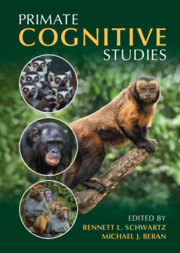
-
Select format
-
- Publisher:
- Cambridge University Press
- Publication date:
- July 2022
- August 2022
- ISBN:
- 9781108955836
- 9781108845434
- 9781108958196
- Dimensions:
- (244 x 170 mm)
- Weight & Pages:
- 1.362kg, 712 Pages
- Dimensions:
- (244 x 170 mm)
- Weight & Pages:
- 1.21kg, 712 Pages
- Subjects:
- Animal Behaviour, Life Sciences, Psychology, Cognition
You may already have access via personal or institutional login- Subjects:
- Animal Behaviour, Life Sciences, Psychology, Cognition
Book description
Researchers have studied non-human primate cognition along different paths, including social cognition, planning and causal knowledge, spatial cognition and memory, and gestural communication, as well as comparative studies with humans. This volume describes how primate cognition is studied in labs, zoos, sanctuaries, and in the field, bringing together researchers examining similar issues in all of these settings and showing how each benefits from the others. Readers will discover how lab-based concepts play out in the real world of free primates. This book tackles pressing issues such as replicability, research ethics, and open science. With contributors from a broad range of comparative, cognitive, neuroscience, developmental, ecological, and ethological perspectives, the volume provides a state-of-the-art review pointing to new avenues for integrative research.
Contents
Metrics
Altmetric attention score
Full text views
Full text views help Loading metrics...
Loading metrics...
* Views captured on Cambridge Core between #date#. This data will be updated every 24 hours.
Usage data cannot currently be displayed.
Accessibility standard: Unknown
Why this information is here
This section outlines the accessibility features of this content - including support for screen readers, full keyboard navigation and high-contrast display options. This may not be relevant for you.
Accessibility Information
Accessibility compliance for the PDF of this book is currently unknown and may be updated in the future.


